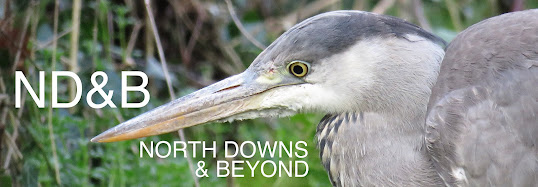Time. Experience. Drive. Luck
How can you get the best out of your birding, particularly if, by getting the best, you actually mean finding good birds? You could do a lot worse than viewing the YouTube video in which Niels Goulem interviews Belgian birder Johan Buckens, about the methods behind his tremendous track record of finding rarities. You can view it here.
Johan comes across as a modest, laid back and pragmatic birder. There are no major revelations to his success, but for it all to be neatly packaged is most helpful. He does start by emphasising that if you bird inland, you are at a major disadvantage (at this point I could only nod incessantly in agreement). He is also quick to point out that even if you live by the coast, specific locality can still be a game changer. He had four main areas of attack - Time (the amount of time you spend), Experience (the ability to know when you are on to something and where those ‘somethings’ might hide), Drive (the willingness to keep on at it) and Luck. He was disarmingly honest about the chances of finding rarity, of the peaks and troughs that even the best of birders go through in finding them. However, there are some birders - we all know one or two - who just pull these rarities out of a proverbial hat on such a regular basis that you know that there is more than luck at play. I know other birders - just as good as these super-finders - who do not have such a hit rate. It isn't an exact science after all, but we can all do things to help ourselves out. So, after watching this video, did it leave me, the inland-patch birder, crestfallen? Did it make me sorry for my ornithological lot? On the contrary, I have been inspired.
Rarity is relative. To Johan in Belgium, or my mates at Dungeness, rarity is at a national level. To me here in Surrey, rarity starts somewhere around the level of a Pied Flycatcher and might - just might - hit the dizzying heights of a Red-backed Shrike or Wryneck. I do not help myself in the quest for rarity by ignoring the better sites close to me, (Beddington and Holmethorpe, both within a few miles from home) and deciding to ply my birding trade on the dry downland. But this is exactly what floats my boat, taking on largely ignored patches and discovering for myself what passes through them. It has paid off in the past, but does require a giant leap of faith and the setting of low expectations.
Johan is no social misfit, no loner who just blasts his way through life behind his optics. He is a teacher and has a family. He paces himself, by just birding each spring and autumn, using the rest of the year to be a 'normal person'. He will go out on at least 5-6 days a week, and if it is poor he will only spend an hour in the field, but if the day shows promise he will put in an all-dayer or return again in the afternoon. This is birding with a plan, with no preconception and allowing for flexibility. And all things that my own birding sadly lacks at the moment.
Maybe I should try it out this Spring. Just visit my three (on foot) patches. Get out on most days, regardless of the weather and cut my losses early if things just are not happening, but - if they are or there is a weather change - put in that extra time.
Time. Experience. Drive. Luck.
I have the first two. I can work on the third. As for the fourth one, I can try and make my own...


Comments